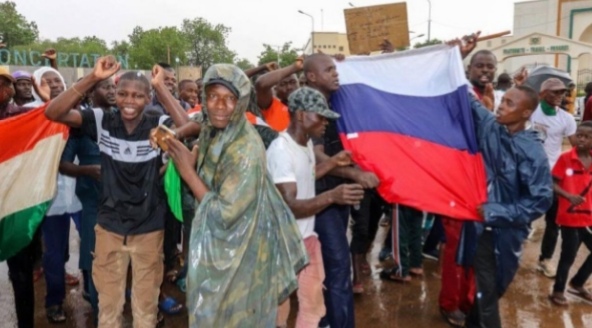The French Military Withdrawal from Niger: A case of Inevitable Forceful Decolonization? By Nnanna Onuoha Arukwe, Ph.D.
5 min read
RECENTLY, THE FRENCH MILITARY STARTED EVACUATING FROM SITES IN SOUTHWEST NIGER IN A MOVE THAT IS SAID TO HAVE FURTHER DAMAGED FRANCE’S IMAGE IN THE WAR-TORN SAHEL AREA OF WEST AFRICA. THE WITHDRAWAL WAS ORDERED BY THE MILITARY REGIME IN NIGER.

Similarly, the militaries of neighboring Mali and Burkina Faso have also successfully driven out French forces since taking control of those countries. This is against the backdrop of the ten-year Islamist insurgency in the Sahel and increasing Euro-American unease about Russia’s presumed growing influence in Africa.
However, the latest episode of the French forces being kicked out of Niger in the wake of similar evictions from other former French colonies in the Sahel region of Africa such as Mali and Burkina Faso could indeed be a manifestation of the deployment of violence to facilitate true decolonization as had hitherto been postulated by revolutionary decolonization thinker, Franz Fanon.
Since the 1960s, the West African nations that were once under French colonial occupation have supposedly formally gained political independence, allowing them the right to rule themselves. Nevertheless, a closer look at these nations’ current social, political, and economic systems indicates an unbroken continuum with the colonial past. It is clear from looking at the political, social, and economic situations in these former French colonies that French colonialism has surprisingly been alive, thanks to the obnoxious pact for the continuation of colonization that the French colonizers forced their African colonies to sign as the only condition for agreeing to self-rule by the colonized peoples.
France signed the obnoxious pact for the continuation of colonization with eleven African countries including Niger. The intention was to keep French colonial rule in Africa intact. Although the agreement was first made on April 9, 1944, it wasn’t put into effect until December 19, 1947. The initiation of the French Pact for the Continuation of Colonialism was one of the key negative developments in Africa’s history of being invaded and colonized.
According to this pact, France would be able to use military force to intervene in any nation that signed it. In addition, it stated that while each nation would maintain its sovereignty, treaties could only be signed with France as a signatory.
In order to maintain French colonial dominance in Africa, the agreement for colonization’s perpetuation also required that the former French colonies’ economies be consciously placed under France’s total control up to the present period. All of these nations continue to use the FCFA, or “Franc des Colonies Françaises d’Afrique” (Franc of the French Colonies in Africa), in lieu of establishing their own national currency. As a result, their national currencies are linked to the French national currency, which, paradoxically, has since vanished with the introduction of the Euro as the common currency for all of the Euro zone’s member states, including France.
The foreign reserves of these countries are also compulsorily deposited in the French central bank and they can only borrow a fraction of what they have deposited with the Franch treasury as loans at incredibly cut-throat rates. Consequently, the French treasury continues to receive over USD 500 billion going to trillions of US dollars, year in and year out, from the France-Africa neo-colonial arrangement based on some sort of colonial tax that France continues to exact from its neo-colonies having coerced these countries to sign to the pact for the continuation of colonization.
Not surprisingly, citizens of Niger and other former French colonies in Africa are continually aggrieved about the monopoly of Air France in Francophone countries, unjust tax arrangements, discriminatory military cooperation, and the dominance of French corporations in the uranium mine industry, among other similar colonial situations. Indeed, a former French President, Jacques Chirac, has been reported as one of the Europeans and particularly French who believe that without African resources, France would slide down into the ranks of a so called Third World power instead of a so called First World power.
Furthermore, as per the pact for the continuation of colonization, French military installations have been set up all across the French West Africa zone. As recently as 2011, the ESF (éléments français au Sénégal) was created supposedly with the stated goals of keeping an eye on all of West Africa and assisting the African nations in the region in fortifying their security. When it comes to French economic, sociopolitical, and military interests, France’s robust military presence in West Africa has given it the power to militarily subjugate a number of its former colonies in Africa. As a result, the African countries are now under a de facto colonial protectorate due to France’s militarization of their territories. Consequently, national armies in the French former colonies have continued to rely on French involvement for the smallest pretexts.
The resentment of the younger generation of Africans towards the French government and the perceived French occupation of their territories stems from this kind of loss of sovereignty and arrest of the capacity for self-determination. This has resulted to a series of coups in the West African region that are led by young military officers, forcing France from the territories of the successful coup-makers, Niger being the most recent.
It is in the forgoing sense that the popular support by the population for the military leaders who carried out the successful coups in the West African countries including Niger that led to the eviction of the French military must be understood. For those unfamiliar with the situation in the former French colonies of Africa it may present a conundrum as to how there could be popular support for a military coup that is in theory violent and anti-constitutional.
The popularity of the coup in Niger and indeed the eviction of France from Niger is not because Africans are anti-democratic; rather, the coups were welcomed and supported by mostly Africa’s younger population because they are dissatisfied with how democracy has been serially abused in their nations by the neo-colonial puppet regimes with the impudent support of the former colonizers.
Thus, as the revolutionary decolonization actor-theorist Franz Fanon had contended that colonization and its counter, decolonization, are essentially violent processes, then the coups in West Africa and the French military’s expulsion from Niger and other places in West Africa may be the violent catalyst for the complete decolonization of African nations, particularly those that had previously been under continuous French colonial occupation and dominance.
Nnanna Onuoha Arukwe, is a Taiwan Fellow and Visiting Scholar at the Taiwan Center for Security Studies of the National Chengchi University.




